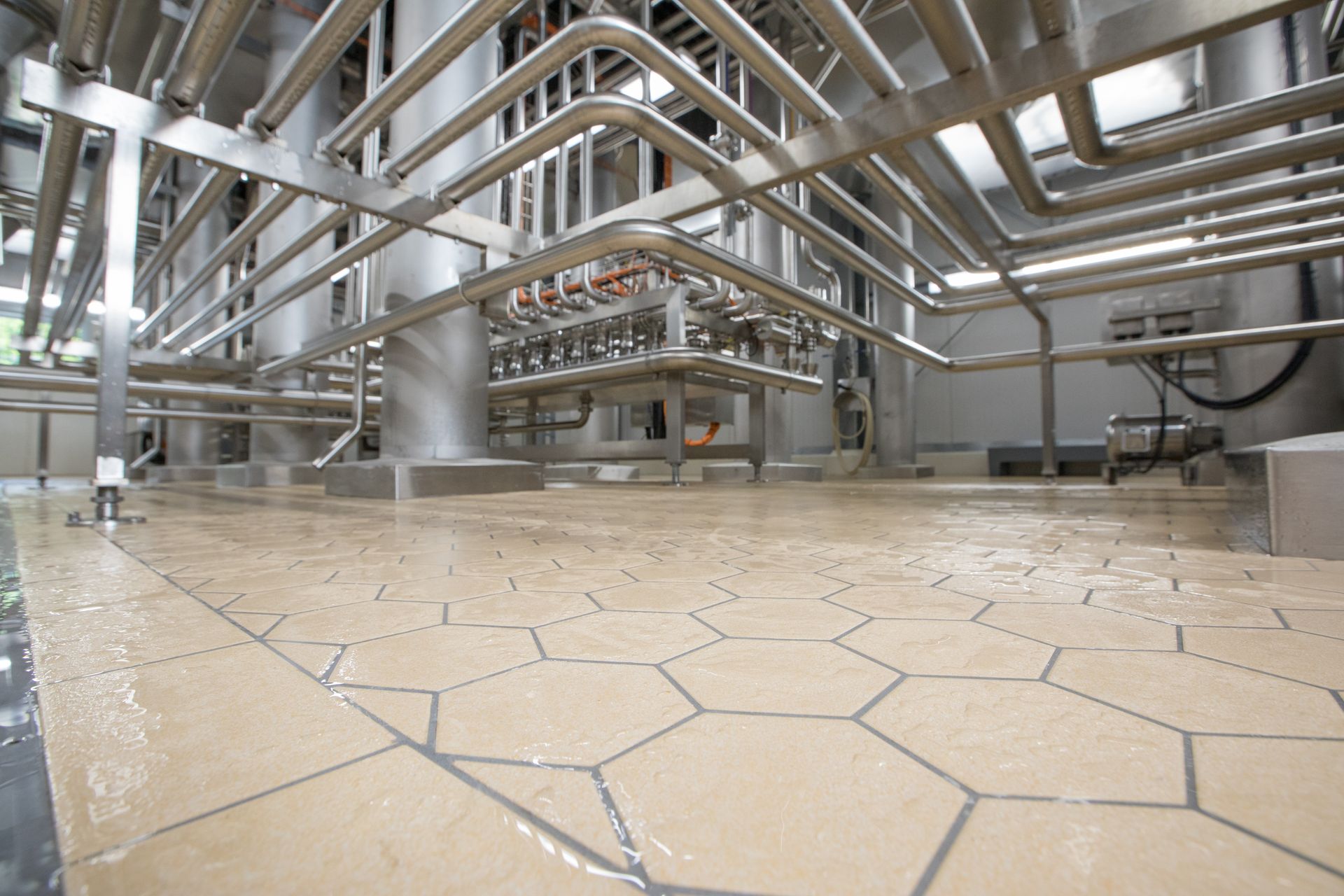Chemical-Resistant Flooring Guide – Stay FDA & USP Compliant
Industries governed by FDA and USP standards require flooring surfaces that withstand harsh chemicals, aggressive cleaning, and constant regulatory scrutiny. The right flooring isn't simply durable; it actively contributes to compliance, safety, and operational efficiency. In this guide, we outline why chemical resistance matters, the flooring criteria needed for compliance, where chemical-resistant flooring is critical, best practices for installation, and why Argelith's engineered tile solutions stand apart.
Why Chemical Resistance Matters in Regulated Environments
Facilities subject to FDA and USP standards face routine exposure to corrosive cleaning agents, disinfectants, acids, and alkalis. When flooring breaks down, it harbors bacteria, risks contamination, and threatens product integrity and regulatory compliance. Chemical resistance ensures longevity, hygiene, and continuous safety in high-risk environments.
Key Flooring Criteria for FDA & USP Compliance
Non-Absorbent and Impervious Surfaces
Fully vitrified tiles with dense, non-porous surfaces prevent seepage of liquids that can lead to bacterial growth. An ultra-low absorption rate resists chemical infiltration, reducing staining and structural compromise.
- Fully Vitrified Structure: A dense, non-porous surface prevents liquid seepage, crucial for maintaining hygiene.
- Low Absorption Rate: Tiles with ultra-low water absorption resist chemical infiltration that causes staining and structural compromise.
Resistance to Cleaning Agents and Corrosive Substances
Regulated environments demand frequent cleaning with strong chemicals. Slip-resistant, textured surfaces help reduce workplace accidents even under wet conditions. Smooth but durable finishes resist degradation during rigorous cleaning.
- Slip Resistance: Textured surfaces help reduce workplace accidents, even under wet or oily conditions.
- Ease of Cleaning: Smooth yet durable finishes support rigorous cleaning regimens without degradation.
Seamless Transitions and Hygienic Design
Narrow joints (1/16" – 1/8") prevent standing water buildup and chipped edges. Compliance demands surfaces that support hygienic design, minimizing places where bacteria can harbor. Tiles should meet or exceed certifications from TCNA, ASTM, and ISO.
- Certifications & Testing: Flooring materials should be tested in accordance with standards from organizations such as TCNA, ASTM, and ISO. Argelith tiles are independently tested for chemical resistance, slip resistance, and durability to support high-risk operational environments.
Industry Use Cases Requiring Chemical Resistance
Pharmaceutical and Cleanroom Facilities
- Pharmaceutical Manufacturing: Protects against spills of solvents and corrosive agents while supporting sterile operations.
Food and Beverage Processing Plants
- Food & Beverage Processing: Withstands acids, sugars, and sanitizers common in daily cleaning routines.
Laboratories and R&D Environments
- aboratories: Resists degradation from strong acids, bases, and alcohol-based cleaners.
- Breweries & Wineries: Surfaces endure lactic acid, caustic washes, and carbonation stress.
Installation Guidelines for Compliance-Critical Spaces
- Substrate Preparation: Ensure proper leveling and moisture mitigation to avoid future failures.
- Grout Selection: Use epoxy grout in chemically intensive areas to prevent degradation and bacterial harboring.
- Joint Design: Narrow joints (1/16" – 1/8") minimize water pooling and chipped edges.
- Installer Expertise: Engage experienced industrial flooring professionals familiar with FDA and USP-regulated projects.
Maintenance and Long-Term Performance
- Initial Cleaning: After installation, a professional cleaning should be performed to remove grout haze and surface residue.
- Routine Cleaning: Use auto-scrubbers with pads; aggressive pads can be used for stubborn residue.
- Inspection Protocols: Regularly check joints and surfaces for signs of wear or chemical attack.
- Ensure cleaning agents are compatible with both tile and grout type. Argelith can assist in reviewing cleaning protocols to protect long-term chemical resistance.
Why Argelith is the Right Partner for Regulated Industries
Argelith offers German-engineered, fully vitrified tile solutions built for the world's most demanding industries. Our tiles deliver proven chemical resistance, slip-resistant textures, and exceptional durability under constant cleaning, heavy machinery, and corrosive conditions. Compliance depends on full system performance — from material to installation to maintenance. Argelith supports this through robust, hygienic surfaces and technical guidance. Backed by a US-based team providing fast delivery, technical support, and project consultation, Argelith is the trusted choice for compliance-critical facilities.
Request a consultation today to explore Argelith’s engineered solutions for compliance-critical industries.
Note: ⚠️
Regulatory compliance with FDA or USP standards is determined at the facility level and depends on overall hygiene, installation, maintenance, and operational procedures. While Argelith’s materials support the requirements of these environments, no flooring product alone guarantees compliance.



